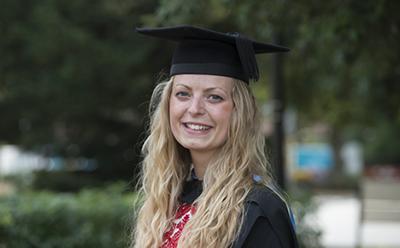Sophie Van Eetvelt MEnvSci Environmental Sciences, 2014
Strategic Partnerships Manager, Department for International Development

Having a relevant degree from a good university definitely makes you more attractive to employers, so it’s a great starting point. In my career so far my knowledge of ecosystem services, climate change, development, conservation and policy has been required for the job.
Why did you choose Southampton?
I was really impressed at the Open Day with the professionalism of the course and the scope of module options. I’d chosen it as an option because its Environmental Science course was highly ranked in the UK.
What did you find most enjoyable about your course?
Having the opportunity to tailor the course to my interests; for example, I always chose to write essays based on Latin America as that’s been a geography of long-term interest to me. Related to this, I also enjoyed that I could do a mix of ‘soft’ and ‘hard’ science modules, some more applied and others theoretical.
You won an award whilst you were studying here, what was it for?
Upon graduating I was awarded the Dean’s Award for academic achievement.
What was your dissertation on, and what do you think was the most important thing you gained from it?
My dissertation was on a rapid appraisal method for cultural ecosystem services in Malawi. I gained so much from it, it’s hard to begin! Perhaps most importantly I gained confidence in my skills, as I researched and decided upon the methodology myself and then conducted the research in Malawi. I became very knowledgeable in the area of ecosystem services and then off the back on my work was offered an internship at Fauna Flora International to work on their cultural ecosystem services toolkit. That internship, in turn, helped me get my job today.
Did the combination of theory and practical field work in your degree give you the confidence and ability to put it all into practice in your career?
It was certainly helpful to have a combination of theory and practice, as employers look for both. I now draw on my practical skills and theoretical knowledge on a daily basis.
What does your job involve?
My job involves a lot of communicating with others, a range of writing tasks from short ministerial briefings to 50-page business cases, research and strategic thinking, monitoring and analysis of results…a bit of everything!
How did you get involved with that kind of work? Where else have you worked before, and has your volunteering helped you in your career?
In the summer holidays and Easter holidays at university I did work experience at an environmental law firm, at the environment agency and Oil Spill Response, plus an internship with Sustainability Action and for the ESPA (Ecosystems Services for Poverty Alleviation) ASSETS research group. I also worked at the Winchester Science Centre. These experiences all helped me to realise what I was interested in and what I may want to do in the future, and they gave me skills and experiences I could talk about in interviews and on my CV. I then did an internship with Fauna Flora International straight after graduating. Following that I went to Nicaragua for 3 months as a volunteer with Raleigh International, through the government International Citizen Service scheme. Upon returning I worked at a call centre whilst job hunting and then worked at the Natural Capital Coalition. Whilst there I applied to the Department for International Development (DFID) graduate scheme and was successful. All my work experience and volunteering was useful to some degree, and still is.
How has your degree helped you in your career so far?
Having a relevant degree from a good university definitely makes you more attractive to employers, so it’s a great starting point. In my career so far my knowledge of ecosystem services, climate change, development, conservation and policy has been required for the job. But then there are also more general skills you get from you degree such as time management, interpersonal skills and self-motivation that have definitely helped too.
What has been your greatest career achievement so far?
I was very happy to be offered a place on the DFID graduate scheme as it’s considered to be quite competitive.
If you could give prospective students one piece of advice, what would it be?
Try lots of things and don’t expect to have the perfect job straight out of university.